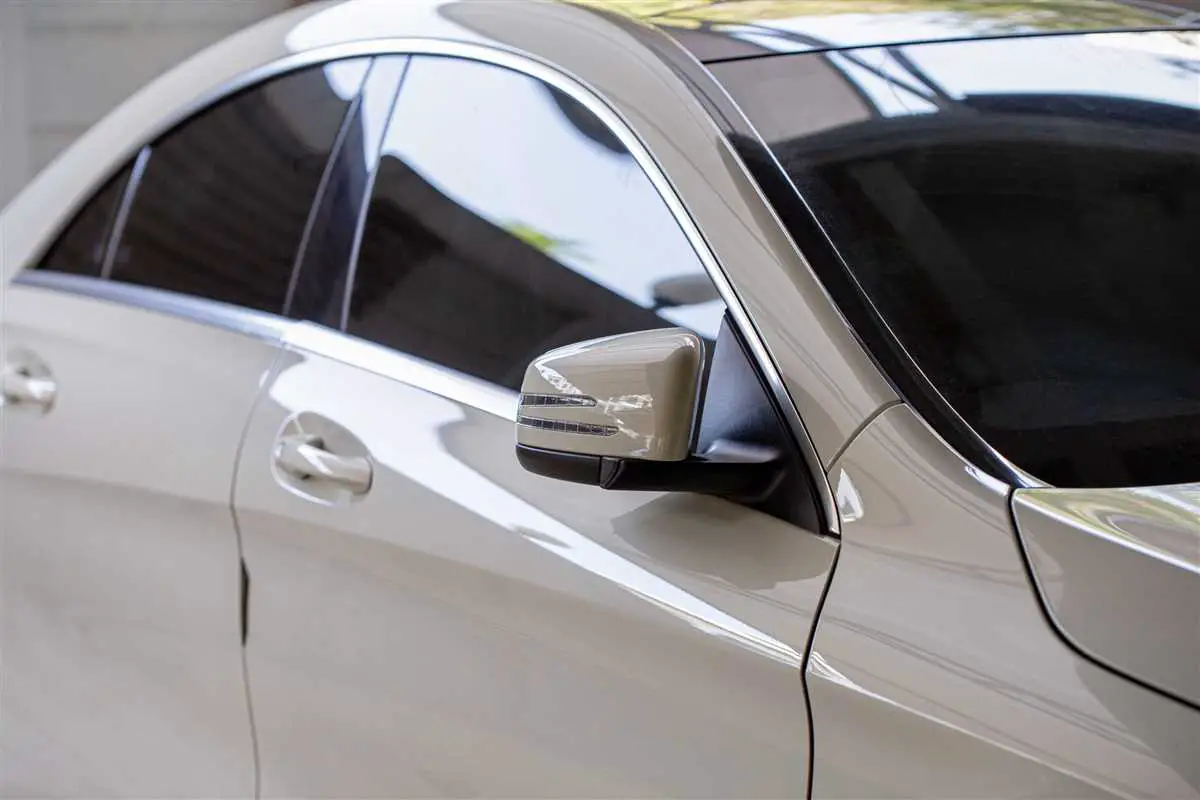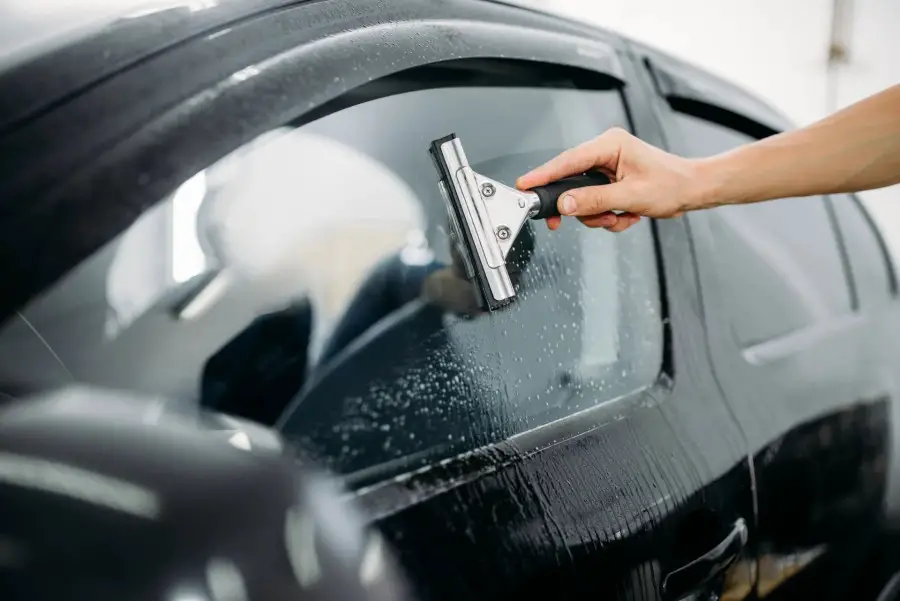Last Updated on February 18, 2024 by Vadym

When it comes to tinting car windows, one common question that often arises is whether the tint is applied to the inside or outside of the windows. The answer to this question is quite simple – window tint is always applied to the inside of the car windows.
Window tint is a thin film that is installed on the inside of the glass. The film is carefully cut to fit the shape and size of each window, and then it is skillfully installed by a professional. The tint film is typically made of polyester and comes in different shades and levels of darkness, providing privacy and reducing the amount of sunlight entering the vehicle.
There are several reasons why window tint is installed on the inside of the car windows. Firstly, tinting the inside ensures that the film is protected from the elements, such as rain, snow, and debris, which could damage the tint if it were applied on the outside. Secondly, installing the tint on the inside allows for a smooth and even application, as the surface is flat and free from irregularities. Lastly, tinting the inside of the windows provides a clearer view from the outside, as there are no potential obstructions or imperfections on the glass.
In conclusion, when tinting your car windows, it is important to remember that the tint is applied to the inside of the windows. This ensures durability, a smooth installation, and a clear view from the outside. If you are considering tinting your car windows, it is recommended to consult with a professional who can guide you through the process and help you choose the right tint for your needs.
Benefits of Tinting Car Windows

Tinting car windows can offer a range of benefits for both the driver and passengers. Here are some of the main advantages:
| Privacy | Tinted windows can provide added privacy, making it harder for people outside to see into the car. This can be particularly useful when parked or driving in busy areas. |
| UV Protection | Tinted windows can block a significant amount of harmful ultraviolet (UV) rays from entering the car. This helps protect the occupants from the harmful effects of the sun, such as skin damage and increased risk of skin cancer. |
| Heat Reduction | Tinting can help reduce the amount of heat that enters the car through the windows, keeping the interior cooler. This can be especially beneficial in hot climates or during the summer months, as it can help reduce the need for air conditioning and improve fuel efficiency. |
| Glare Reduction | Tinted windows can also help reduce glare from the sun and bright headlights, making it easier and safer to drive. This is particularly useful for drivers who are sensitive to bright light or have vision issues. |
| Interior Protection | Tinting can help protect the car’s interior from fading and cracking caused by prolonged exposure to the sun’s rays. This can help preserve the appearance and value of the vehicle. |
Overall, tinting car windows can provide a range of benefits that can enhance comfort, safety, and the overall driving experience.
Improved Comfort and Privacy
Tinting the inside or outside of car windows can greatly improve the overall comfort and privacy of your vehicle.
When you tint your car windows, you can reduce the amount of heat that enters your vehicle. This can help keep the interior of your car cooler, especially during hot summer months. With less heat coming in, you won’t have to blast the air conditioning as much, which can save on fuel and improve the overall efficiency of your car.
Tinted windows also offer increased privacy. They make it more difficult for others to see inside your car, allowing you to feel more secure and protected. Whether you’re parked at a busy shopping center or driving down a crowded street, tinted windows keep prying eyes out.
In addition to privacy, tinted windows can also protect your belongings. By hiding your valuables from view, you reduce the likelihood of break-ins or theft. This added layer of security can offer peace of mind whether you’re parking on a public street or in a dimly lit parking lot.
Lastly, tinted windows can provide relief from glare. Whether it’s the blinding sun or the headlights of oncoming cars, glare can be a major distraction and reduce visibility. Tinted windows help to reduce glare and improve your driving experience, making it safer and more enjoyable.
Protection from UV Rays and Heat
Tinting car windows provides a layer of protection against harmful UV rays and excessive heat. When sunlight enters a car, it can lead to the fading of upholstery, dashboard, and other interior components. Moreover, UV rays are also harmful to human skin and can increase the risk of skin cancer.
Tinted windows significantly reduce the amount of UV rays that enter the car, protecting both the occupants and the car’s interior. The film used in window tinting acts as a barrier that blocks a significant portion of UV rays from passing through the glass.
In addition to UV protection, window tinting can also help in reducing heat buildup inside the car. During hot summer days, the sunlight can heat up the car’s interior, making it uncomfortable for the passengers. Tinted windows help in reducing the amount of heat that enters the car, keeping the interior cooler.
By minimizing UV rays and heat, window tinting provides a more comfortable and safer driving experience. It helps in preserving the interior of the car, preventing sun damage to upholstery, and reducing the need for cooling systems. Moreover, a cooler interior also helps in improving fuel efficiency by reducing the reliance on air conditioning systems.
It is important to note that not all window tints are created equal when it comes to UV and heat protection. It is recommended to choose a high-quality window tint that is specifically designed for UV and heat rejection. Professional installation is also crucial to ensure proper adherence and effectiveness of the tint.
Enhanced Safety and Security
Tinting car windows, whether it is done on the inside or outside, can provide enhanced safety and security for both the driver and the passengers. Here are some ways in which window tinting can help:
|
Glare Reduction: |
Tinted windows can significantly reduce glare from the sun, headlights, and other sources of bright light. This can greatly enhance visibility while driving, helping to prevent accidents caused by blinding glare. |
|
Privacy: |
Tinted windows provide an added level of privacy, making it harder for outsiders to see inside the vehicle. This can help protect personal belongings from theft and discourage potential criminals from targeting the car. |
|
UV Ray Protection: |
Window tinting can block harmful UV rays from entering the car, reducing the risk of skin cancer and other sun-related health issues. It can also help prevent fading and damage to the interior of the vehicle, such as the upholstery and dashboard. |
|
Shatter Resistance: |
In case of an accident or break-in, tinted windows are more shatter-resistant than untreated windows. The film used in window tinting can hold shattered glass together, reducing the risk of injury from flying glass fragments. |
|
Temperature Regulation: |
Tinted windows can help regulate the temperature inside the car by reducing heat build-up. This can make the vehicle more comfortable, especially during hot summer months, and lessen the reliance on air conditioning, which can improve fuel efficiency. |
Reduced Glare and Eye Fatigue
One of the main benefits of tinting the inside or outside of car windows is the reduced glare and eye fatigue that it provides. Glare from the sun or headlights can be distracting and dangerous, especially while driving. Tinted windows help to block out a significant amount of the sun’s glare, making it easier and safer to see the road ahead.
In addition to reducing glare, tinting also helps to reduce eye fatigue. When the sun’s rays are directly in your eyes, it can strain your eyes and cause discomfort. Tinted windows help to filter out harmful UV rays, protecting your eyes and reducing the strain on them. This can be particularly beneficial during long drives or on sunny days when the sun is at its brightest.
By reducing glare and eye fatigue, tinted windows can improve visibility and make driving more comfortable. This can result in safer and more enjoyable driving experiences, especially for those who frequently travel during the day or in bright conditions.
Shielding the Interior from Fading
One of the main reasons why people choose to tint their car windows is to protect the interior of their vehicle from fading. Sunlight contains ultraviolet (UV) rays, which can penetrate through the windows and cause damage to the upholstery, dashboard, and other interior components.
By applying window tint film on the inside of the car windows, you can reduce the amount of UV rays that enter the vehicle. The film acts as a barrier, blocking a significant percentage of the harmful UV radiation. This helps to prevent the fading and aging of the interior materials.
Window tinting can also protect your skin from the harmful effects of UV rays. Prolonged exposure to sunlight can lead to skin damage, including sunburns and an increased risk of skin cancer. By reducing the amount of UV radiation that enters your car, tinted windows can provide an added layer of protection against these risks.
When choosing the right window tint film, make sure to look for one that offers a high level of UV protection. Most reputable tinting companies offer films that block up to 99% of UV rays. Additionally, some films also have added features such as heat reduction and glare reduction, which can further enhance the comfort and safety of your vehicle.
In conclusion, tinting the inside of your car windows can effectively shield the interior from fading caused by UV radiation. It can also provide protection for your skin and increase your overall comfort while driving. Consulting with a professional tinting company can help you choose the right film that meets your specific needs and ensures the longevity of your car’s interior.
| Benefits of Tinting Inside car windows for protection: |
|---|
| 1. Reduces UV radiation |
| 2. Prevents fading and aging of interior materials |
| 3. Protects the skin from harmful UV rays |
| 4. Enhances comfort and safety while driving |
Increased Resale Value
One of the benefits of tinting your car windows, whether it is the inside or outside, is that it can help increase the resale value of your vehicle. Having tinted windows can make your car more appealing to potential buyers, as it offers added privacy, protection from UV rays, and a sleeker appearance.
When potential buyers see tinted windows, they may perceive your car as being well-maintained and taken care of. Tinted windows also give the impression that the car has been protected from the sun’s harmful rays, which can cause fading and damage to the interior. This added protection can help maintain the condition of your car’s interior, making it more attractive to buyers and potentially increasing its resale value.
In addition to the perceived value, tinted windows can also offer practical benefits that can further increase the resale value. Window tinting helps block out a significant amount of UV rays, reducing the amount of heat that enters the car. This can make the interior more comfortable, especially during hot summer months, and can also help protect the upholstery and dashboard from sun damage. Buyers may be willing to pay more for a car that has already had this level of protection installed.
Overall, whether you choose to tint the inside or outside of your car windows, the added benefits can help increase the resale value of your vehicle. Tinted windows offer a range of advantages, including increased privacy, protection from UV rays, and a sleeker appearance, all of which can make your car more appealing to potential buyers and potentially increase its selling price.
